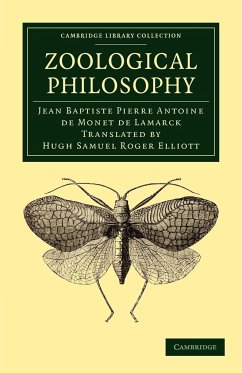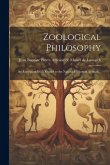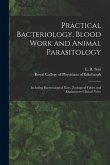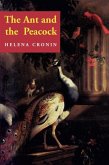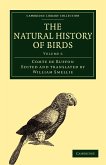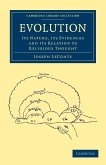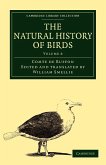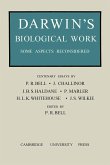Jean Baptiste Pierre Antoine De Lamarck
Zoological Philosophy
Jean Baptiste Pierre Antoine De Lamarck
Zoological Philosophy
- Broschiertes Buch
- Merkliste
- Auf die Merkliste
- Bewerten Bewerten
- Teilen
- Produkt teilen
- Produkterinnerung
- Produkterinnerung
Lamarck outlined his theory of 'soft inheritance', which influenced Darwin, in this 1809 work, eventually translated into English in 1914.
Andere Kunden interessierten sich auch für
![Zoological Philosophy; an Exposition With Regard to the Natural History of Animals .. Zoological Philosophy; an Exposition With Regard to the Natural History of Animals ..]() Zoological Philosophy; an Exposition With Regard to the Natural History of Animals ..29,99 €
Zoological Philosophy; an Exposition With Regard to the Natural History of Animals ..29,99 €![Practical Bacteriology, Blood Work and Animal Parasitology: Including Bacteriological Keys, Zoological Tables and Explanatory Clinical Notes Practical Bacteriology, Blood Work and Animal Parasitology: Including Bacteriological Keys, Zoological Tables and Explanatory Clinical Notes]() Practical Bacteriology, Blood Work and Animal Parasitology: Including Bacteriological Keys, Zoological Tables and Explanatory Clinical Notes26,99 €
Practical Bacteriology, Blood Work and Animal Parasitology: Including Bacteriological Keys, Zoological Tables and Explanatory Clinical Notes26,99 €![The Ant and the Peacock The Ant and the Peacock]() Helena CroninThe Ant and the Peacock90,99 €
Helena CroninThe Ant and the Peacock90,99 €![The Natural History of Birds - Volume 6 The Natural History of Birds - Volume 6]() Georges Louis Le Clerc BuffonThe Natural History of Birds - Volume 661,99 €
Georges Louis Le Clerc BuffonThe Natural History of Birds - Volume 661,99 €![Evolution Evolution]() Joseph Le ConteEvolution41,99 €
Joseph Le ConteEvolution41,99 €![The Natural History of Birds - Volume 8 The Natural History of Birds - Volume 8]() Georges Louis Le Clerc BuffonThe Natural History of Birds - Volume 856,99 €
Georges Louis Le Clerc BuffonThe Natural History of Birds - Volume 856,99 €![Darwin's Biological Work Darwin's Biological Work]() Darwin's Biological Work48,99 €
Darwin's Biological Work48,99 €-
-
-
Lamarck outlined his theory of 'soft inheritance', which influenced Darwin, in this 1809 work, eventually translated into English in 1914.
Hinweis: Dieser Artikel kann nur an eine deutsche Lieferadresse ausgeliefert werden.
Hinweis: Dieser Artikel kann nur an eine deutsche Lieferadresse ausgeliefert werden.
Produktdetails
- Produktdetails
- Verlag: Cambridge University Press
- Seitenzahl: 506
- Erscheinungstermin: 3. Oktober 2011
- Englisch
- Abmessung: 216mm x 140mm x 30mm
- Gewicht: 707g
- ISBN-13: 9781108038423
- ISBN-10: 1108038425
- Artikelnr.: 34449926
- Herstellerkennzeichnung
- Libri GmbH
- Europaallee 1
- 36244 Bad Hersfeld
- gpsr@libri.de
- Verlag: Cambridge University Press
- Seitenzahl: 506
- Erscheinungstermin: 3. Oktober 2011
- Englisch
- Abmessung: 216mm x 140mm x 30mm
- Gewicht: 707g
- ISBN-13: 9781108038423
- ISBN-10: 1108038425
- Artikelnr.: 34449926
- Herstellerkennzeichnung
- Libri GmbH
- Europaallee 1
- 36244 Bad Hersfeld
- gpsr@libri.de
Introduction Hugh Elliot; Preface; Preliminary discourse; Part I.
Considerations on the Natural History of Animals, their Characters,
Affinities, Organisation, Classification and Species: 1. On artificial
devices in dealing with the productions of nature; 2. Importance of the
consideration of affinities; 3. Of species among living bodies, and the
idea that we should attach to that word; 4. General principles concerning
animals; 5. On the true arrangement and classification of animals; 6.
Degradation and simplification of organisation, from one extremity to the
other of the animal chain, proceeding from the most complex to the
simplest; 7. Of the influence of the environment on the activities and
habits of animals, and the influence of the activities and habits of these
living bodies in modifying their organisation and structure; 8. Of the
natural order of animals, and the way in which their classification should
be drawn up, so as to be in conformity with the actual order of nature;
Additions to the subject-matter of Chaps. 7 and 8; Part II. An Enquiry into
the Physical Causes of Life, the Conditions Required for its Existence, the
Exciting Force of its Movements, the Faculties Which It Confers on Bodies
Possessing It, and the Results of its Presence in Those Bodies:
Introduction; 1. Comparison of inorganic bodies with living bodies,
followed by a parallel between animals and plants; 2. Of life, what it
consists of, and the conditions of its existence in a body; 3. Of the
exciting cause of organic movements; 4. Of orgasm and irritability; 5. Of
cellular tissue, regarded as the matrix in which all organisation has been
cast; 6. Of direct or spontaneous generation; 7. Of the immediate results
of life in a body; 8. Of the faculties common to all living bodies; 9. Of
the faculties peculiar to certain living bodies; Summary of Part II; Part
III. An Enquiry into the Physical Causes of Feeling into the Force Which
Produces Actions, and Lastly into the Origin of the Acts of Intelligence
Observed in Various Animals: Introduction; 1. Of the nervous system, its
formation, and the various sorts of functions that it can fulfil; 2. Of the
nervous fluid; 3. Of physical sensibility and the mechanism of sensation;
4. Of the inner feeling, the emotions that it may experience, and the power
which it thence derives for the production of actions; 5. Of the force
which produces the actions of animals, and of certain peculiar facts
resulting from the use of the force; 6. Of the will; 7. Of the
understanding, its origin, and the origin of ideas; 8. Of the principal
acts of the understanding, or those of the first order from which all the
rest are derived; Index.
Considerations on the Natural History of Animals, their Characters,
Affinities, Organisation, Classification and Species: 1. On artificial
devices in dealing with the productions of nature; 2. Importance of the
consideration of affinities; 3. Of species among living bodies, and the
idea that we should attach to that word; 4. General principles concerning
animals; 5. On the true arrangement and classification of animals; 6.
Degradation and simplification of organisation, from one extremity to the
other of the animal chain, proceeding from the most complex to the
simplest; 7. Of the influence of the environment on the activities and
habits of animals, and the influence of the activities and habits of these
living bodies in modifying their organisation and structure; 8. Of the
natural order of animals, and the way in which their classification should
be drawn up, so as to be in conformity with the actual order of nature;
Additions to the subject-matter of Chaps. 7 and 8; Part II. An Enquiry into
the Physical Causes of Life, the Conditions Required for its Existence, the
Exciting Force of its Movements, the Faculties Which It Confers on Bodies
Possessing It, and the Results of its Presence in Those Bodies:
Introduction; 1. Comparison of inorganic bodies with living bodies,
followed by a parallel between animals and plants; 2. Of life, what it
consists of, and the conditions of its existence in a body; 3. Of the
exciting cause of organic movements; 4. Of orgasm and irritability; 5. Of
cellular tissue, regarded as the matrix in which all organisation has been
cast; 6. Of direct or spontaneous generation; 7. Of the immediate results
of life in a body; 8. Of the faculties common to all living bodies; 9. Of
the faculties peculiar to certain living bodies; Summary of Part II; Part
III. An Enquiry into the Physical Causes of Feeling into the Force Which
Produces Actions, and Lastly into the Origin of the Acts of Intelligence
Observed in Various Animals: Introduction; 1. Of the nervous system, its
formation, and the various sorts of functions that it can fulfil; 2. Of the
nervous fluid; 3. Of physical sensibility and the mechanism of sensation;
4. Of the inner feeling, the emotions that it may experience, and the power
which it thence derives for the production of actions; 5. Of the force
which produces the actions of animals, and of certain peculiar facts
resulting from the use of the force; 6. Of the will; 7. Of the
understanding, its origin, and the origin of ideas; 8. Of the principal
acts of the understanding, or those of the first order from which all the
rest are derived; Index.
Introduction Hugh Elliot; Preface; Preliminary discourse; Part I.
Considerations on the Natural History of Animals, their Characters,
Affinities, Organisation, Classification and Species: 1. On artificial
devices in dealing with the productions of nature; 2. Importance of the
consideration of affinities; 3. Of species among living bodies, and the
idea that we should attach to that word; 4. General principles concerning
animals; 5. On the true arrangement and classification of animals; 6.
Degradation and simplification of organisation, from one extremity to the
other of the animal chain, proceeding from the most complex to the
simplest; 7. Of the influence of the environment on the activities and
habits of animals, and the influence of the activities and habits of these
living bodies in modifying their organisation and structure; 8. Of the
natural order of animals, and the way in which their classification should
be drawn up, so as to be in conformity with the actual order of nature;
Additions to the subject-matter of Chaps. 7 and 8; Part II. An Enquiry into
the Physical Causes of Life, the Conditions Required for its Existence, the
Exciting Force of its Movements, the Faculties Which It Confers on Bodies
Possessing It, and the Results of its Presence in Those Bodies:
Introduction; 1. Comparison of inorganic bodies with living bodies,
followed by a parallel between animals and plants; 2. Of life, what it
consists of, and the conditions of its existence in a body; 3. Of the
exciting cause of organic movements; 4. Of orgasm and irritability; 5. Of
cellular tissue, regarded as the matrix in which all organisation has been
cast; 6. Of direct or spontaneous generation; 7. Of the immediate results
of life in a body; 8. Of the faculties common to all living bodies; 9. Of
the faculties peculiar to certain living bodies; Summary of Part II; Part
III. An Enquiry into the Physical Causes of Feeling into the Force Which
Produces Actions, and Lastly into the Origin of the Acts of Intelligence
Observed in Various Animals: Introduction; 1. Of the nervous system, its
formation, and the various sorts of functions that it can fulfil; 2. Of the
nervous fluid; 3. Of physical sensibility and the mechanism of sensation;
4. Of the inner feeling, the emotions that it may experience, and the power
which it thence derives for the production of actions; 5. Of the force
which produces the actions of animals, and of certain peculiar facts
resulting from the use of the force; 6. Of the will; 7. Of the
understanding, its origin, and the origin of ideas; 8. Of the principal
acts of the understanding, or those of the first order from which all the
rest are derived; Index.
Considerations on the Natural History of Animals, their Characters,
Affinities, Organisation, Classification and Species: 1. On artificial
devices in dealing with the productions of nature; 2. Importance of the
consideration of affinities; 3. Of species among living bodies, and the
idea that we should attach to that word; 4. General principles concerning
animals; 5. On the true arrangement and classification of animals; 6.
Degradation and simplification of organisation, from one extremity to the
other of the animal chain, proceeding from the most complex to the
simplest; 7. Of the influence of the environment on the activities and
habits of animals, and the influence of the activities and habits of these
living bodies in modifying their organisation and structure; 8. Of the
natural order of animals, and the way in which their classification should
be drawn up, so as to be in conformity with the actual order of nature;
Additions to the subject-matter of Chaps. 7 and 8; Part II. An Enquiry into
the Physical Causes of Life, the Conditions Required for its Existence, the
Exciting Force of its Movements, the Faculties Which It Confers on Bodies
Possessing It, and the Results of its Presence in Those Bodies:
Introduction; 1. Comparison of inorganic bodies with living bodies,
followed by a parallel between animals and plants; 2. Of life, what it
consists of, and the conditions of its existence in a body; 3. Of the
exciting cause of organic movements; 4. Of orgasm and irritability; 5. Of
cellular tissue, regarded as the matrix in which all organisation has been
cast; 6. Of direct or spontaneous generation; 7. Of the immediate results
of life in a body; 8. Of the faculties common to all living bodies; 9. Of
the faculties peculiar to certain living bodies; Summary of Part II; Part
III. An Enquiry into the Physical Causes of Feeling into the Force Which
Produces Actions, and Lastly into the Origin of the Acts of Intelligence
Observed in Various Animals: Introduction; 1. Of the nervous system, its
formation, and the various sorts of functions that it can fulfil; 2. Of the
nervous fluid; 3. Of physical sensibility and the mechanism of sensation;
4. Of the inner feeling, the emotions that it may experience, and the power
which it thence derives for the production of actions; 5. Of the force
which produces the actions of animals, and of certain peculiar facts
resulting from the use of the force; 6. Of the will; 7. Of the
understanding, its origin, and the origin of ideas; 8. Of the principal
acts of the understanding, or those of the first order from which all the
rest are derived; Index.

